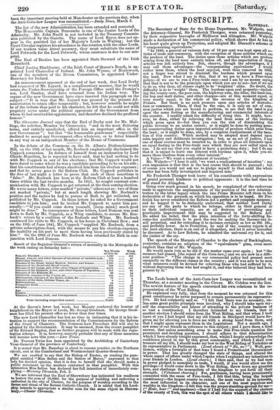POSTSCRIPT.
BATITEDA7f. -
The Secretary of State for the Home Department, Mr. Walpole, end the Attorney-General, Sir Frederick Thesiger, were returned yesterday, by their respective boroughs of Midhnrat and Abingdon. Mr. Walpoli made a declaration of his commercial policy, which shows that he has in his heart quite given up Protection, and adopted Mr. Disraeli's scheme of "compensating equivalents." " In 1846, a general ad valorem duty of 10 per cent was kept upon all ar- ticles of trade and commerce with the exception of those articles which are the produce of the land. The duties upon those articles which are produce arising from the land were entirely taken off, and the importation of those articles was left entirely free. But, observe, though the advantages, if I may call them advantages—the , compensating equivalents' I would rather term them, which the land enjoyed, were thus removed in 1846, not a finger was stirred to diminish the burdens which pressed upon the land. Now what I say is this, that if we are to have a Free-trade policy—if we are to run a Free-trade race—and I am by no means saying that that is not to be the principle upon which you are to act—but if we are to do so, why then, all classes ought to be 'weighted' alike. No doubt, the difficulty is so to 'weight' them. The burdens upon real property—includ- ing the county-rate, the poor-rate, the highway-rate, the tithe, the land-tax, the hop and malt duties, and other charges—are at this moment equal, or very nearly equal, to the whole of the revenue of the kingdom of Prussia. But there is no such pressure upon any articles of manufac- ture or commerce. Then, if that be the case, it is only an act of com- mon justice which you are bound to perform, to see that the land is put upon the same footing as the manufacturing and commercial interests of the country. I readily admit the difficulty of doing this. It might, how- ever, be done, either by relieving the land from some of the burdens which press upon it—but then you run the risk of diminishing the public revenue to an undue extent; or it might be done by putting gene- ral countervailing. duties upon imported articles of produce which arise from the land ; or it might be done, also, by a complete readjustment of the taxa- tion of this country. Which method may be adopted must depend upon calm inquiry and deliberate investigation ; but, as an act of justice, I say one of these courses must be resorted to, in order to place all interests upon an equal footing in the Free-trade race which they are now called upon to run. I do not say that you ought to have a protecting duty ; but I do say that it is unjust to leave one interest with burdens upon it, while you re- move those burdens from every other interest."
A Voice—" We want a readjustment of taxation." Mr. Walpole—" I hear it said, we want a readjustment of taxation' : my- own impression is that that is the best course that should be pursued ; but of course you would not ask me to pledge myself to that until the whole- matter has been fully investigated and inquired into."
Sir Frederick Thesiger took leave of his constituents with expressions of genial personal kindness to political opponents : it is the last time he will stand for Abingdon.
Going over much ground in his speech, he complained of the endeavour made to aggravate the unpleasantness of the position of the new Adminis- tration by the bitter legacy which the late Prime Minister left them in his declaration of the grounds on which his opposition is to be based. Sir Fre- derick has never considered the Reform Act a perfect and complete measure; and he begged it to be distinctly understood, that neither Lord Derby nor any of the party to which he belongs, either in their general or in their individual capacity, are at all desirous of preventing any- practicable improvement that may be suggested in the Reform Act He added his belief, that the plain intention of the forty-shilling In- come-tax qualification is to pave the way for making the Income-tax it- self perpetual, and for extending it to incomes certainly as low as 681. 10e, and probably lower. As to Protection, he said if the country rejects it at the next election' there is an end of it altogether, and let it never hereafter be discussed. As to Law Reform, he admitted the universal cry for it, and. the justice of the cry.
The speech of the Marquis of Chandos to the electors of Bneldnghanr, yesterday, contains an adoption of the " equivalents " plan, even more explicit than that of Mr. Walpole. He would again vote as he did if the matter came over again ; but "the measure had passed, [the repeal of the Corn-law,j and we are now in a diffe- rent position. "The change in our commercial policy had pressed most unequally on the different classes in the country; and it was now to be seen what measures could be devised for relieving those who had suffered by it, without depressing those who had sought it, and who believed they had been gainers by it"


























 Previous page
Previous page